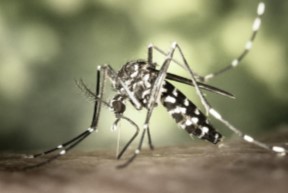
PALMDALE –The Aedes aegypti mosquito, also known as the yellow fever mosquito, was detected in two more areas in Palmdale, authorities announced Tuesday.
One sample of infected mosquitoes was collected near 25th Street East and Avenue R-8, and the other sample was collected near 10th Street West and Avenue O-8, according to the Antelope Valley Mosquito & Vector Control District.
“These invasive mosquitoes are becoming more prevalent throughout the Antelope Valley ,” said District Manager Cei Kratz.
Aedes aegypti mosquitoes are small (about ¼ inch), black and white, and feed almost exclusively on humans, biting aggressively all day long. These habits are different from our native Culex mosquitoes that bite in the cooler times like the morning and the evening. Female Aedes aegypti mosquitoes lay eggs in small containers, just above the water line. The eggs can dry up and survive for six or more months, waiting for the container to re-flood so they can hatch. Aedes aegypti mosquitoes are known transmitters of diseases like yellow fever, dengue fever, chikungunya, and zika virus.
This type of mosquito was first discovered in the Antelope Valley in October of 2018, but has now been found in two areas of Lancaster and a three areas in Palmdale during the 2019 mosquito season.
AVMVCD personnel have increased mosquito surveillance in the area and will continue to place traps that are designed to attract egg-laying Aedes mosquitoes.
The District is urging residents to protect themselves by following these recommendations:
- Clean up clutter in the yard. Invasive Aedes are ‘container breeders’ and will lay their eggs in toys, discarded tires, bird baths, potted plants, soda
cans and even trash. - Be sure window and door screens are in good repair to prevent mosquitoes from entering your home.
- Check your rain gutters and lawn drains to make sure they aren’t holding water and debris.
- Clean and scrub bird baths and pet watering dishes weekly.
- Check indoor plants that are kept in standing water for mosquito activity (i.e. Bamboo and Philodendron).
- Wear EPA registered insect repellents with ingredients such as DEET, picaridin, oil of lemon eucalyptus, or IR3535.
- Wear long sleeve shirts, long pants, socks and shoes when mosquitoes are most active.
- Report any day-time biting mosquitoes to the AVMVCD at 661-942-2917.
To stay up-to-date on mosquito-related information, visit www.avmosquito.org. For questions or services, contact the Antelope Valley Mosquito & Vector Control District by phone 661-942-2917.
[Information via news release from the Antelope Valley Mosquito & Vector Control District.]
Previous related story: Invasive Aedes mosquito found in Palmdale
–